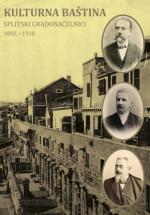Dr. Duje Rendić-Miočević, prvi splitski narodnjački gradonačelnik
Dr Duje Rendić-Miočević, the First Mayor of Split who was Member of People’s Party
Author(s): Ante Rendić-MiočevićSubject(s): Local History / Microhistory, Political history, Government/Political systems, 19th Century, Sociology of Politics
Published by: DRUŠTVO PRIJATELJA KULTURNE BAŠTINE - SPLIT
Keywords: Split; mayor; lawyer; People’s Party; elections; Imperial Council; Dalmatian Parliament;
Summary/Abstract: The most significant event in the history of Dalmatia and Split in the second half of the nineteenth century was the victory of the People’s Party at the elections that were held in June 1882. The victory itself resulted in the appointment of the new patriotic officials in the Municipality and marked the end of lingering conflicts with the members of the previously ruling Autonomist Party. The Autonomists, led by Antonio Bajamonti, who was also the mayor of the city, had been previously accused of incompentence and corruption. Therefore, a new mayor was elected at the session of the Municipal Council on 28th October 1882. The new mayor, Duje Rendić Miočević, who was a lawyer by profession, was also, at the time, a representative in both the Diet of Dalmatia in Zadar and the Imperial Council in Vienna. In addition, six new municipal assessors were appointed: Gajo Bulat, then a leading figure in the People’s Party, was one of them. The election results echoed throughout Dalmatia and Croatia. They represented the final achievement of long-standing patriotic goals, such as the introduction of Croatian as the official language of the authorities and the unification of the northern and southern parts of Croatia. Duje Rendić-Miočević was born in Split on 4th November 1834, where he also died in 1915. He graduated law from University in Padua. There, he also obtained a PhD degree. In the mid-1860s, he started a law practice in Sinj. Several months later, he moved his office to Split. There he became more politically active in the People’s Party, although, according to several different resources, he himself did not harbour any political ambitions. That became apparent when he resigned from the mayoral office, that he held in the period 1882 – 1885, on account of disagreement with the leader of the party, Gajo Bulat. Althugh he did not want to run for representative in the Imperial Council, he remained active in the Diet of Dalmatia until 1889. Then he retired from public and political life and restarted his law practice in Sinj. A number of papers and newspaper articles have been written about Duje Rendić Miočević’s accomplishments. Although they have been perceived in a positive light, their detailed analysis has revealed inaccuracies. The author of this paper, therefore, addresses the inaccuracies by providing a review of comments and perceptions that have been made about Duje Rendić Miočević’s achievements by both renowned historians and journalists. In this way, the author intends to reveal that Miočević’s achievements are far more significant than it has been so far addressed. The final part of the paper discusses the Miočević family valuables, such as the mayor’s portrait by Faustina Vecchietti and a programme of concert that was held in front of the mayor’s ancestral house in the small piazza named Mihovilova poljana, on the day of his inauguration.
Journal: KULTURNA BAŠTINA : ČASOPIS ZA PITANJA PROŠLOSTI SPLITSKOGA PODRUČJA
- Issue Year: 2018
- Issue No: 44
- Page Range: 13-38
- Page Count: 26
- Language: Croatian

